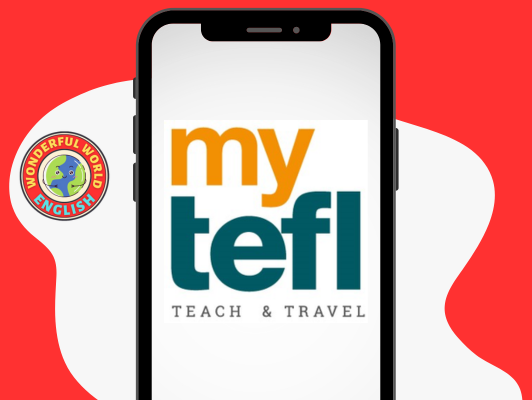Contents
Toggle
Meet David De’ Ath, founder, editor, and writer at Wonderful World English. With his extensive background as an English teacher, David provides valuable insights and practical tips on ESL for students and teachers alike.
The changing landscape of education has embraced the digital realm, offering flexibility and accessibility across various fields.
This evolution means that obtaining a TEFL (Teaching English as a Foreign Language) certification is more convenient than ever for aspiring educators looking to teach English as a foreign language.
With the rise of online TEFL courses, potential teachers are asking whether they can complete their education through the compact screens of their phones.
The good news is that many TEFL providers have optimized their courses for mobile devices, acknowledging the modern necessity for on-the-go learning.
This adaptation allows for a seamless experience where prospective teachers can access course materials, participate in interactive sessions, and even complete assessments directly from their phones.
Given the importance of TEFL for those looking to teach English abroad or online, the ability to engage with the course content anytime and anywhere dismantles barriers of space and time, thus broadening the prospects for enthusiastic participants.
Key Takeaways
- TEFL certification is now accessible via mobile devices, offering greater flexibility.
- Online TEFL courses are designed to be compatible with various platforms, including phones.
- Mobile access to TEFL education enables aspirants to learn and qualify at their convenience.

Understanding TEFL and Its Importance
TEFL, or Teaching English as a Foreign Language, is a qualification that equips individuals to teach English to non-native speakers.
This certification is valuable for those seeking to educate English learners both abroad and in domestic settings where English is not the first language.
What Is TEFL?
TEFL refers to the field of Teaching English as a Foreign Language.
Primarily, it involves educating individuals whose first language is not English, enhancing their ability to read, write, speak, and comprehend English.
A typical TEFL certificate can be obtained through various courses, often comprising a minimum of 120 hours of instruction.
Such courses cover a range of topics, from language pedagogy to practical teaching skills.
Benefits of a TEFL Certification
A TEFL certification is more than just a document; it’s a gateway to global opportunities.
Those who obtain a TEFL qualification can teach English across continents, in diverse cultures and settings.
Here are some key benefits:
- Global Mobility: A TEFL certificate opens doors to teaching positions worldwide, offering the chance to travel and experience new cultures.
- Professional Development: Pursuing TEFL courses provides teaching experience and can enhance one’s teaching skills, making one a more effective educator.
- Career Opportunities: With the demand for English language instruction on the rise, a TEFL qualification can lead to numerous teaching job possibilities both abroad and in EFL (English as a Foreign Language) classrooms domestically.
- Cultural Exchange: TEFL instructors often find themselves immersed in different cultures, fostering a unique exchange of ideas and knowledge.
Obtaining a TEFL certification can be a transformative experience, providing educators with the qualifications needed to make a significant impact on English language learners worldwide.
For more insights into TEFL certificates, check out the guide below!
Related: TEFL Certificates: Your Guide to Teaching English Abroad

Exploring Online TEFL Courses
Online TEFL courses offer the convenience of studying from any location, using various devices, including phones.
These courses are designed to provide comprehensive teacher training, with structures accommodating self-paced learning.
Advantages of Online Courses
Online TEFL courses provide flexibility and accessibility, allowing prospective teachers to learn at their own pace and sometimes even entirely on their mobile phones.
Such courses usually cater to a wide audience, including individuals with busy schedules or those living in areas without easy access to in-person training.
Self-paced learning can be a significant advantage for those who need to balance other commitments with their studies.
Course Content and Structure
Typically, online TEFL courses are comprehensive, covering topics from language theory to practical teaching advice.
The courses are structured into modules, which might include grammar, lesson planning, classroom management, and methods of teaching English as a foreign language.
Students can often access interactive materials such as videos, quizzes, and forums, which enrich their learning experience.
Accreditation and Recognition
When selecting an online TEFL course, it’s crucial to choose one that is accredited.
Accreditation ensures that the course has met specific standards set by a recognized body.
The TEFL accreditation by these bodies is what makes the certification internationally recognized, helping graduates find employment worldwide.
Some courses boast of accreditation from both US and UK government regulated awarding bodies, indicating a high level of recognition.
Exclusive Offer for Our Readers
We believe in the value that MyTEFL brings to aspiring TEFL teachers.
As an affiliate, we’re excited to offer you an exclusive deal.
You can claim a remarkable 30% off on your MyTEFL course by clicking on the affiliate image below.
This discount is an excellent opportunity to invest in a quality TEFL certification at an affordable price.
Note: The link leads to MyTEFL’s website, where you can learn more about their courses and use the discount code for at least 30% off.

The Logistics of Using a Phone for TEFL Courses
When considering completing a TEFL course via a smartphone, students must evaluate the aspects of mobile compatibility and the challenges associated with studying on a smaller screen.
Mobile Compatibility
Many TEFL providers now ensure their online courses are mobile-friendly, allowing students the convenience to study from anywhere.
These courses are typically designed to be self-paced, accommodating the varying schedules of learners.
Students should check if the course platform operates effectively on mobile browsers or if the provider offers a dedicated app for enhanced usability.
It is essential that the course content, often provided in formats like PDFs or textbooks, is easily accessible and legible on smartphone screens.
Furthermore, upon completing the course, students should be able to download or receive their certificates directly on their mobile devices.
Studying on a Smaller Screen
The shift from a desktop to a smaller screen can impact the learning experience.
Reading materials may require more zooming and scrolling, and interactive elements might be less convenient to navigate.
However, for many learners, the flexibility to study on a mobile device outweighs these inconveniences.
They’ll need to be prepared to adjust to the following:
- Zooming in and out to read the text and view course materials clearly.
- Scrolling more frequently to navigate through lessons and content.
Learners may also utilize various mobile functionalities, like built-in dictionaries or text-to-speech options, to enhance their studying process.

Starting Your TEFL Journey on Your Phone
Embarking on a Teaching English as a Foreign Language (TEFL) course no longer requires sitting in a traditional classroom.
Many providers now offer the flexibility to complete a TEFL course using just your phone.
Registration and Enrollment
To commence a TEFL course on your phone, prospective students must first complete the registration process.
This generally involves filling out an online form and submitting a deposit to secure a spot in the course.
Providers can facilitate this process via their mobile-friendly websites, ensuring user ease of access.
Managing Coursework
Once enrolled, managing course materials and following the curriculum is essential.
TEFL providers like myTEFL have designed their online systems to adapt to mobile interfaces, allowing students to access lectures, resources, and reading materials.
Completing Assessments and Earning Your Certificate
Completing assessments plays a crucial role in earning a TEFL certificate.
Using a smartphone, students can submit assignments, take part in quizzes, and receive feedback.
Upon successful completion of all requirements, a TEFL certificate is typically issued.
Certificates might be available as PDF certificates, directly downloadable to the student’s phone, signifying that they are qualified to teach English to speakers of other languages.

Conclusion
In conclusion, the advent of mobile-compatible TEFL courses represents a significant leap forward in making English language teaching certifications accessible and flexible.
Aspiring educators can now pursue TEFL certification from virtually anywhere, using just their smartphones, making it easier to fit their studies into a busy lifestyle or to learn on the go.
This digital evolution in TEFL education caters to the modern learner’s needs and expands the horizons for those seeking to teach English globally, breaking down previous barriers of time and location.
With the right course selection, mobile learning can be just as effective and enriching as traditional classroom settings.
It offers a practical and contemporary pathway to achieving teaching proficiency and opens doors to international teaching opportunities.
We hope you find value in this information; you can reach out if you require any support.
Have a wonderful day!
Image Attribution: All images licensed via canva.com





